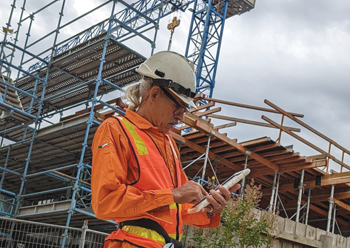
 Commercial buildings currently account for almost a third of the global energy consumption.
Commercial buildings currently account for almost a third of the global energy consumption.
Honeywell has launched its new carbon energy management software – known as Carbon & Energy Management – that enables building owners to track and optimise energy performance against carbon reduction goals, down to a device or asset level.
The software is the centerpiece of Honeywell’s new Sustainable Buildings solutions portfolio, which is now available to help building owners and operators meet two pressing – yet often conflicting – objectives: reducing the environmental impact of buildings while optimising indoor air quality to support occupant well-being, with the aim of helping them to meet carbon neutral goals, says the US-headquartered company.
Carbon & Energy Management has been designed for the thousands of companies that have voluntarily pledged to meet sustainability targets but are seeking for the knowledge and the tools to properly measure progress and optimise their carbon and energy footprints, according to Honeywell.
“Companies face increasing pressure today – from stakeholders as well as regulatory agencies – to curb energy consumption, reduce carbon emissions and create more sustainable, healthier facilities. There’s an urgent reason for this: commercial buildings currently account for almost a third of the global energy consumption and 37 per cent of global energy-related carbon dioxide CO2 emissions. While 28 per cent of those emissions are related to building operations – or the energy used to heat, cool and power the building – many building owners likely don’t have device or asset level insight into energy consumption or carbon impact,” says a spokesman for the company.
Leveraging the Honeywell Forge enterprise performance management software solution’s artificial intelligence (AI) and machine learning (ML) algorithms, Carbon & Energy Management is said to autonomously identify and implement energy conservation measures to help drive efficiency, resiliency and accountability throughout a real estate portfolio. It continuously investigates, analyses and optimises building performance, down to an asset-specific level, measuring critical sustainability KPIs (key performance indicators) including carbon emissions.
“The buildings industry has long worked to improve energy efficiency and reduce carbon impact, but it is imperative to make meaningful change in the near term – and that means building owners need better data about their operations,” says Manish Sharma, Vice President and General Manager of Sustainable Buildings, Honeywell. “Given the increased awareness of and investment in sustainability, it’s critical for a company to know – and to clearly communicate to stakeholders – how its facilities are optimising energy baselines to reduce their carbon impact. We’re helping customers create new metrics for success and removing the complexity of carbon management while balancing healthier spaces with our ready now solutions.”
“Regional governments are rapidly progressing on the path towards achieving carbon neutrality and have laid out guidelines to improve energy consumption and building efficiency standards,” says Sultan Chatila, Chief Commercial Officer, Honeywell Building Technologies, Middle East, Turkey and Africa. “In the UAE, where electricity consumption within commercial buildings stands at 36 per cent, the government has set a 2050 target of improving energy efficiency by close to 40 per cent and cutting CO2 emissions by nearly 70 per cent. With such momentum to reduce carbon footprint, the commercial buildings sector is in urgent need of readily available technologies that can help lower energy-related emissions.”
According to recent market studies, reducing a building’s carbon footprint can potentially increase its commercial value.
Honeywell Carbon & Energy Management establishes an energy performance baseline using up to a three-year usage history, live meter data and environmental factors to determine which assets are driving energy consumption. The enterprise-level Carbon & Energy Management software provides a real-time dashboard of critical sustainability KPIs; aggregates carbon data from energy-related emission sources in a building – gas, electricity and fuel sources; reduces energy consumption using advanced building control capabilities; and reduces carbon footprint without compromising occupant well-being or comfort.
“Carbon & Energy Management continuously collects energy use data 24/7, logged at 15-minute intervals from submeters connected to all energy-consuming assets to collect granular consumption information. This data allows Honeywell to help customers establish a rigorously derived baseline, provides a roadmap for carbon neutral, and helps customers to execute the roadmap to help meet their carbon neutral goals. The solution allows building owners to avoid capital outlays for technology upgrades to meet sustainability reporting demands and minimize the time required to implement solutions,” Chatila explains.
Honeywell’s advanced Sustainable Buildings portfolio is designed to help meet energy efficiency goals, improve occupant well-being and change the way occupants experience a building.








.jpg)




.jpg)




























.jpg)


































